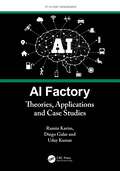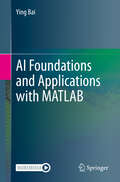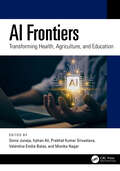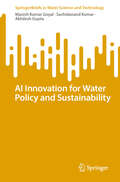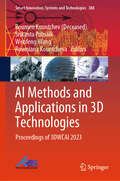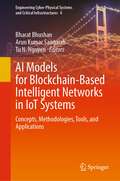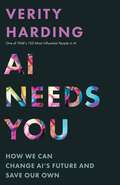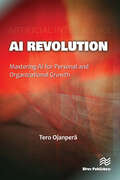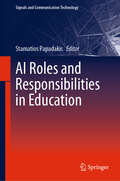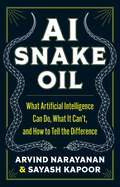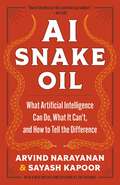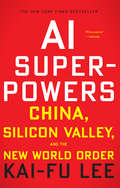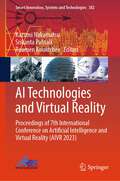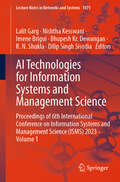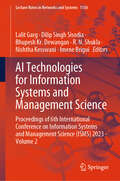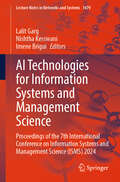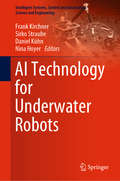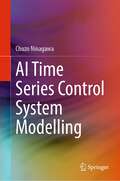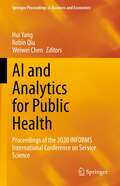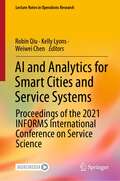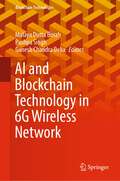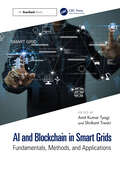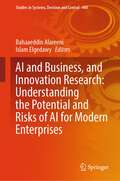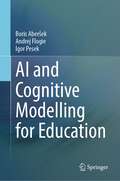- Table View
- List View
AI Factory: Theories, Applications and Case Studies (ICT in Asset Management)
by Uday Kumar Diego Galar Ramin KarimThis book provides insights into how to approach and utilise data science tools, technologies, and methodologies related to artificial intelligence (AI) in industrial contexts. It explains the essence of distributed computing and AI technologies and their interconnections. It includes descriptions of various technology and methodology approaches and their purpose and benefits when developing AI solutions in industrial contexts. In addition, this book summarises experiences from AI technology deployment projects from several industrial sectors. Features: Presents a compendium of methodologies and technologies in industrial AI and digitalisation. Illustrates the sensor-to-actuation approach showing the complete cycle, which defines and differentiates AI and digitalisation. Covers a broad range of academic and industrial issues within the field of asset management. Discusses the impact of Industry 4.0 in other sectors. Includes a dedicated chapter on real-time case studies. This book is aimed at researchers and professionals in industrial and software engineering, network security, AI and machine learning (ML), engineering managers, operational and maintenance specialists, asset managers, and digital and AI manufacturing specialists.
AI Foundations and Applications with MATLAB
by Ying BaiThis textbook provides fundamentals and practical skills on AI foundations and applications with two MATLAB programming modes. It includes twelve chapters with detailed introductions for the foundation knowledge of AI, structures, key components, and hands-on AI projects implemented in various applications in our world. Unlike other AI related textbooks, in which the Python is used, the MATLAB is adopted in this textbook. The Python programming mode builds AI projects with functions involving huge blocks of codes, which is a difficult task. However, in MATLAB mode, provides two programming styles, Apps, and function library. The Apps graphical user interface (GUIs) assist users, especially the beginners, to learn and build AI projects with no coding lines quickly and easily. To compensate the possible code-hiding in Apps, MATLAB provides a Converting Codes function to allow users to convert those Apps to the related codes. It enables users to have a clear picture between Apps and detailed coding process. The function library enables users to build AI projects with detailed codes. This textbook also includes homework questions, exercises, lab projects and case studies. This book is designed as a textbook for advanced-level students in Computer Science or Computer Engineering. Also, AI engineers, who have an interest in learning and developing professional AI applications to solve real problems in the world will want to purchase this book.
AI Frontiers: Transforming Health, Agriculture, and Education
by Valentina Emilia Balas Prabhat Kumar Srivastava Sonia Juneja Irphan Ali Monika NagarThe rapid advancement of artificial intelligence (AI) is revolutionizing key sectors critical to global progress. AI Frontiers: Transforming Health, Agriculture, and Education delves into how cutting-edge AI innovations are addressing some of the world’s most pressing challenges. This comprehensive volume explores the transformative impact of AI across healthcare, agriculture, and industrial landscapes, offering insights into practical applications, emerging trends, and future opportunities. By blending theoretical foundations with real-world case studies, this book empowers readers with actionable knowledge to leverage AI effectively.What sets this book apart is its interdisciplinary approach, combining technical depth with sector-specific insights. It goes beyond the basics to highlight ethical considerations, data governance frameworks, and sustainable development initiatives. Each chapter presents a roadmap for integrating AI solutions to enhance productivity, efficiency, and decision-making in diverse industries.Key Features: In-depth exploration of AI’s role in healthcare, from predictive analytics in diagnostics to AI-driven drug discovery and personalized treatment strategies. Detailed insights into AI applications in agriculture, including precision farming, crop disease prediction, and resource optimization. Coverage of industrial innovations powered by AI, such as predictive maintenance, process automation, and quality control systems. Case studies illustrating successful AI implementations in real-world scenarios. Discussion of ethical AI deployment, data privacy challenges, and strategies to bridge the digital divide. Forward-looking perspectives on AI’s role in advancing the United Nations’ Sustainable Development Goals (SDGs). This book is an essential resource for researchers, industry professionals, policymakers, and students seeking to understand the transformative power of AI. Whether you are a tech enthusiast, academic, or decision-maker, AI Frontiers offers valuable insights to help you navigate the rapidly evolving landscape of AI-driven innovation.
AI Innovation for Water Policy and Sustainability (SpringerBriefs in Water Science and Technology)
by Manish Kumar Goyal Akhilesh Gupta Sachidanand KumarIn the face of unprecedented challenges in managing water resources, the integration of artificial intelligence (AI) emerges as a revolutionary force, reshaping the landscape of water conservation, treatment, irrigation, policy formulation, watershed management, and the monitoring of groundwater and surface water. This book explores the transformative role of AI in the water domain, exploring cutting-edge applications and innovative solutions that promise to address pressing issues in sustainable water management. As we navigate the complexities of a changing climate, population growth, and urbanization, the chapters within this book offer insights into how AI technologies can enhance efficiency, optimize resource utilization, and provide data-driven strategies for ensuring the resilience and sustainability of our vital water ecosystems. From intelligent water treatment systems to precision agriculture and policy decision support, each chapter unfolds a narrative of AI-driven advancements, providing a comprehensive guide for researchers, practitioners, and policymakers navigating the intersection of artificial intelligence and water management.
AI Methods and Applications in 3D Technologies: Proceedings of 3DWCAI 2023 (Smart Innovation, Systems and Technologies #388)
by Srikanta Patnaik Roumen Kountchev Wenfeng Wang Roumiana KountchevaThis book features a collection of high-quality, peer-reviewed research papers presented at Second 'World Conference on Intelligent and 3D Technologies' (WCI3DT 2023), held in China during 26–28 May 2023. The book provides an opportunity to researchers and academia as well as practitioners from industry to publish their ideas and recent research development work on all aspects of 3D imaging technologies and artificial intelligence, their applications, and other related areas. The book presents ideas and the works of scientists, engineers, educators, and students from all over the world from institutions and industries.
AI Models for Blockchain-Based Intelligent Networks in IoT Systems: Concepts, Methodologies, Tools, and Applications (Engineering Cyber-Physical Systems and Critical Infrastructures #6)
by Bharat Bhushan Arun Kumar Sangaiah Tu N. NguyenThe goal of this book is to explore various security paradigms such as Machine Learning, Big data, Cyber Physical Systems, and Blockchain to address both intelligence and reconfigurability in various IoT devices. The book further aims to address and analyze the state of the art of blockchain-based intelligent networks in IoT systems and related technologies including healthcare sector. AI can ease, optimize, and automate the blockchain-based decision-making process for better governance and higher performance in IoT systems. Considering the incredible progress made by AI models, a blockchain system powered by intelligent AI algorithms can detect the existence of any kind of attack and automatically invoke the required defense mechanisms. In case of unavoidable damage, AI models can help to isolate the compromised component from the blockchain platform and safeguard the overall system from crashing. Furthermore, AI models can also contribute toward the robustness and scalability of blockchain-based intelligent IoT networks. The book is designed to be the first-choice reference at university libraries, academic institutions, research and development centers, information technology centers, and any institutions interested in integration of AI and IoT. The intended audience of this book include UG/PG students, Ph.D. scholars of this fields, industry technologists, young entrepreneurs, professionals, network designers, data scientists, technology specialists, practitioners, and people who are interested in exploring the role of AI and blockchain technology in IoT systems.
AI Needs You: How We Can Change AI's Future and Save Our Own
by Verity HardingA humanist manifesto for the age of AIArtificial intelligence may be the most transformative technology of our time. As AI&’s power grows, so does the need to figure out what—and who—this technology is really for. AI Needs You argues that it is critical for society to take the lead in answering this urgent question and ensuring that AI fulfills its promise.Verity Harding draws inspiring lessons from the histories of three twentieth-century tech revolutions—the space race, in vitro fertilization, and the internet—to empower each of us to join the conversation about AI and its possible futures. Sharing her perspective as a leading insider in technology and politics, she rejects the dominant narrative, which often likens AI&’s advent to that of the atomic bomb. History points the way to an achievable future in which democratically determined values guide AI to be peaceful in its intent; to embrace limitations; to serve purpose, not profit; and to be firmly rooted in societal trust.AI Needs You gives us hope that we, the people, can imbue AI with a deep intentionality that reflects our best values, ideals, and interests, and that serves the public good. AI will permeate our lives in unforeseeable ways, but it is clear that the shape of AI&’s future—and of our own—cannot be left only to those building it. It is up to us to guide this technology away from our worst fears and toward a future that we can trust and believe in.
AI Needs You: How We Can Change AI's Future and Save Our Own
by Verity HardingA humanist manifesto for the age of AIArtificial intelligence may be the most transformative technology of our time. As AI&’s power grows, so does the need to figure out what—and who—this technology is really for. AI Needs You argues that it is critical for society to take the lead in answering this urgent question and ensuring that AI fulfills its promise.Verity Harding draws inspiring lessons from the histories of three twentieth-century tech revolutions—the space race, in vitro fertilization, and the internet—to empower each of us to join the conversation about AI and its possible futures. Sharing her perspective as a leading insider in technology and politics, she rejects the dominant narrative, which often likens AI&’s advent to that of the atomic bomb. History points the way to an achievable future in which democratically determined values guide AI to be peaceful in its intent; to embrace limitations; to serve purpose, not profit; and to be firmly rooted in societal trust.Now with a new foreword by the author, AI Needs You gives us hope that we, the people, can imbue AI with a deep intentionality that reflects our best values, ideals, and interests, and that serves the public good. AI will permeate our lives in unforeseeable ways, but it is clear that the shape of AI&’s future—and of our own—cannot be left only to those building it. It is up to us to guide this technology away from our worst fears and toward a future that we can trust and believe in.
AI Revolution: Mastering AI for Personal and Organizational Growth
by Tero Ojanperä""The AI Revolution"" is a practical guide to using new AI tools, such as ChatGPT, DALLE and Midjourney. Learn how to multiply your productivity by guiding or prompting AI in various ways. The book also introduces Microsoft Copilot, Google Bard, and Adobe Photoshop Generative Fill, among other new applications.ChatGPT reached a hundred million users in just two months after its release, faster than any other application before. This marked the advent of the generative AI era. Generative AI models generate text, images, music, videos, and even 3D models in ways previously thought impossible for machines. The book explains in an understandable manner how these AI models work.The book provides examples of how AI increases productivity, which professions are changing or disappearing, and how job markets will evolve in the coming years. With this book, you'll learn to recognize the opportunities and risks AI offers. Understand what this change demands from individuals and companies and what strategic skills are required. The book also covers legal questions caused by generative AI, like copyrights, data protection, and AI regulation. It also ponders societal impacts. AI produces content, thus influencing language, culture, and even worldviews. Therefore, it's crucial to understand by whom and how AI is trained. The AI revolution started by ChatGPT is just the beginning. This handbook is for you if you want to keep up with the rapid development of AI.
AI Roles and Responsibilities in Education (Signals and Communication Technology)
by Stamatios PapadakisThis book explores how artificial intelligence (AI) is reshaping education through practical, pedagogical, and ethical lenses. It provides educators, policymakers, and researchers with evidence-based strategies for integrating AI tools into teaching and learning, particularly within STEAM education. Drawing from real-world implementations, including an in-depth case study of postgraduate teacher training in Europe, the author presents AI not merely as a tool but as a catalyst for educational transformation. Topics include generative AI, curriculum design, ethical integration, and responsible innovation. From adaptive tutoring systems to prompt engineering, the book equips readers with the knowledge and frameworks needed to critically and creatively engage with AI in classrooms. Demonstrates classroom-tested strategies for AI use in STEAM and broader educational contexts; Highlights ethical challenges, including algorithmic bias, transparency, and human oversight; Offers a future-oriented framework for AI literacy and curriculum integration.
AI Snake Oil: What Artificial Intelligence Can Do, What It Can’t, and How to Tell the Difference
by Arvind Narayanan Sayash KapoorFrom two of TIME&’s 100 Most Influential People in AI, what you need to know about AI—and how to defend yourself against bogus AI claims and productsConfused about AI and worried about what it means for your future and the future of the world? You&’re not alone. AI is everywhere—and few things are surrounded by so much hype, misinformation, and misunderstanding. In AI Snake Oil, computer scientists Arvind Narayanan and Sayash Kapoor cut through the confusion to give you an essential understanding of how AI works and why it often doesn&’t, where it might be useful or harmful, and when you should suspect that companies are using AI hype to sell AI snake oil—products that don&’t work, and probably never will.While acknowledging the potential of some AI, such as ChatGPT, AI Snake Oil uncovers rampant misleading claims about the capabilities of AI and describes the serious harms AI is already causing in how it&’s being built, marketed, and used in areas such as education, medicine, hiring, banking, insurance, and criminal justice. The book explains the crucial differences between types of AI, why organizations are falling for AI snake oil, why AI can&’t fix social media, why AI isn&’t an existential risk, and why we should be far more worried about what people will do with AI than about anything AI will do on its own. The book also warns of the dangers of a world where AI continues to be controlled by largely unaccountable big tech companies.By revealing AI&’s limits and real risks, AI Snake Oil will help you make better decisions about whether and how to use AI at work and home.
AI Snake Oil: What Artificial Intelligence Can Do, What It Can’t, and How to Tell the Difference
by Arvind Narayanan Sayash KapoorFrom two of TIME&’s 100 Most Influential People in AI, what you need to know about AI—and how to defend yourself against bogus AI claims and productsConfused about AI and worried about what it means for your future and the future of the world? You&’re not alone. AI is everywhere—and few things are surrounded by so much hype, misinformation, and misunderstanding. In AI Snake Oil, computer scientists Arvind Narayanan and Sayash Kapoor cut through the confusion to give you an essential understanding of how AI works and why it often doesn&’t, where it might be useful or harmful, and when you should suspect that companies are using AI hype to sell AI snake oil—products that don&’t work, and probably never will.While acknowledging the potential of some AI, such as ChatGPT, AI Snake Oil uncovers rampant misleading claims about the capabilities of AI and describes the serious harms AI is already causing in how it&’s being built, marketed, and used in areas such as education, medicine, hiring, banking, insurance, and criminal justice. The book explains the crucial differences between types of AI, why organizations are falling for AI snake oil, why AI can&’t fix social media, why AI isn&’t an existential risk, and why we should be far more worried about what people will do with AI than about anything AI will do on its own. The book also warns of the dangers of a world where AI continues to be controlled by largely unaccountable big tech companies.By revealing AI&’s limits and real risks, AI Snake Oil will help you make better decisions about whether and how to use AI at work and home.
AI Superpowers: China, Silicon Valley, and the New World Order
by Kai-Fu LeeDr. Kai-Fu Lee—one of the world’s most respected experts on AI and China—reveals that China has suddenly caught up to the US at an astonishingly rapid and unexpected pace. <P><P>In AI Superpowers, Kai-fu Lee argues powerfully that because of these unprecedented developments in AI, dramatic changes will be happening much sooner than many of us expected. Indeed, as the US-Sino AI competition begins to heat up, Lee urges the US and China to both accept and to embrace the great responsibilities that come with significant technological power. <P><P>Most experts already say that AI will have a devastating impact on blue-collar jobs. But Lee predicts that Chinese and American AI will have a strong impact on white-collar jobs as well. Is universal basic income the solution? <P><P> In Lee’s opinion, probably not. But he provides a clear description of which jobs will be affected and how soon, which jobs can be enhanced with AI, and most importantly, how we can provide solutions to some of the most profound changes in human history that are coming soon. <P><b>A New York Times Bestseller</b>
AI Technologies and Virtual Reality: Proceedings of 7th International Conference on Artificial Intelligence and Virtual Reality (AIVR 2023) (Smart Innovation, Systems and Technologies #382)
by Srikanta Patnaik Kazumi Nakamatsu Roumen KountchevThis book gathers a collection of selected works and new research results of scholars and graduate students presented at the 7th International Conference on Artificial Intelligence and Virtual Reality (AIVR 2023) held in Kumamoto, Japan during July 21-23, 2023. The focus of the book is interdisciplinary in nature and includes research on all aspects of artificial intelligence and virtual reality, from fundamental development to the applied system. The book covers topics such as system techniques, performance, and implementation; content creation and modelling; cognitive aspects, perception, user behaviour; AI technologies; interactions, interactive and responsive environments; AI/VR applications and case studies.
AI Technologies for Information Systems and Management Science: Proceedings of 6th International Conference on Information Systems and Management Science (ISMS) 2023 - Volume 1 (Lecture Notes in Networks and Systems #1071)
by Lalit Garg Nishtha Kesswani Imene Brigui Dilip Singh Sisodia Bhupesh Kr. Dewangan R. N. ShuklaThis book explores the integration of artificial intelligence into various facets of information systems and management. It delves into machine learning, natural language processing, and computer vision applications, illustrating how these technologies revolutionize decision-making, optimization, and data analysis. Through case studies and theoretical frameworks, the book elucidates the transformative potential of AI in enhancing organizational efficiency and strategic planning, making it an essential reading for professionals and researchers navigating the intersection of AI and business. This book also highlights the efforts to build ethical norms and frameworks for AI adoption in MIS, as well as data privacy and security considerations.
AI Technologies for Information Systems and Management Science: Proceedings of 6th International Conference on Information Systems and Management Science (ISMS) 2023 - Volume 2 (Lecture Notes in Networks and Systems #1136)
by Lalit Garg Nishtha Kesswani Imene Brigui Dilip Singh Sisodia Bhupesh Kr. Dewangan R. N. ShuklaThis text will be replaced by the correct informationtext as soon as we get it.
AI Technologies for Information Systems and Management Science: Proceedings of the 7th International Conference on Information Systems and Management Science (ISMS) 2024 (Lecture Notes in Networks and Systems #1479)
by Lalit Garg Nishtha Kesswani Imene BriguiThis book brings together leading experts, academics, and industry professionals to explore how AI is transforming decision-making, data analytics, operations, and strategic management across diverse sectors. Dive into the cutting-edge world of artificial intelligence with AI Technologies for Information Systems and Management Science, a comprehensive book is featuring peer-reviewed research from the 7th International Conference on Information Systems and Management Science (ISMS 2024). Covering topics such as intelligent systems, machine learning integration, AI-driven process optimization, and ethical considerations, this proceedings book offers a rich blend of theoretical insights and practical applications. Whether you're a researcher, practitioner, or student, you&’ll find valuable perspectives on how emerging AI technologies are reshaping the foundations of modern information systems and management practices. Gain inspiration from real-world case studies, stay ahead with the latest innovations, and deepen your understanding of AI&’s role in driving smarter, more adaptive organizations. With contributions from global thought leaders, this book is an essential resource for anyone interested in the future of intelligent business and digital transformation. Embrace the power of AI—empowering tomorrow&’s systems, today.
AI Technology for Underwater Robots (Intelligent Systems, Control and Automation: Science and Engineering #96)
by Frank Kirchner Sirko Straube Daniel Kühn Nina HoyerThis book provides exclusive insight into the development of a new generation of robotic underwater technologies. Deploying and using even the most simple and robust mechanical tools is presenting a challenge, and is often associated with an enormous amount of preparation, continuous monitoring, and maintenance. Therefore, all disciplinary aspects (e.g. system design, communication, machine learning, mapping and coordination, adaptive mission planning) are examined in detail and together this gives an extensive overview on research areas influencing next generation underwater robots. These robotic underwater systems will operate autonomously with the help of the most modern artificial intelligence procedures and perform environmental monitoring as well as inspection and maintenance of underwater structures. The systems are designed as modular and reconfigurable systems for long term autonomy to remain at the site for longer periods of time. New communication methods using AI enable missions of hybrid teams of humans and heterogeneous robots. Thus this volume will be an important reference for scientists on every qualification level in the field of underwater technologies, industrial maritime applications, and maritime science.
AI Time Series Control System Modelling
by Chuzo NinagawaThis book describes the practical application of artificial intelligence (AI) methods using time series data in system control. This book consistently discusses the application of machine learning to the analysis and modelling of time series data of physical quantities to be controlled in the field of system control.Since dynamic systems are not stable steady states but changing transient states, the changing transient states depend on the state history before the change. In other words, it is essential to predict the change from the present to the future based on the time history of each variable in the target system, and to manipulate the system to achieve the desired change. In short, time series is the key to the application of AI machine learning to system control. This is the philosophy of this book: "time series data" + "AI machine learning" = "new practical control methods".This book can give my helps to undergradate or graduate students, institute researchers and senior engineers whose scientific background are engineering, mathematics, physics and other natural sciences.
AI and Analytics for Public Health: Proceedings of the 2020 INFORMS International Conference on Service Science (Springer Proceedings in Business and Economics)
by Hui Yang Weiwei Chen Robin QiuThis volume offers the state-of-the-art research and developments in service science and related research, education and practice areas. It showcases emerging technology and applications in fields including healthcare, energy, finance, information technology, transportation, sports, logistics, and public services. Regardless of size and service, a service organization is a service system. Because of the socio-technical nature of a service system, a systems approach must be adopted to design, develop, and deliver services, aimed at meeting end users’ both utilitarian and socio-psychological needs. Effective understanding of service and service systems often requires combining multiple methods to consider how interactions of people, technology, organizations, and information create value under various conditions. Chapters highlight ways to approach such technical challenges in service science and are based on submissions from the 2020 INFORMS International Conference on Service Science.
AI and Analytics for Smart Cities and Service Systems: Proceedings of the 2021 INFORMS International Conference on Service Science (Lecture Notes in Operations Research)
by Weiwei Chen Kelly Lyons Robin QiuThis book showcases state-of-the-art advances in service science and related fields of research, education, and practice. It presents emerging technologies and applications in contexts ranging from healthcare, energy, finance, and information technology to transportation, sports, logistics, and public services. Regardless of its size and service, every service organization is a service system. Due to the socio-technical nature of service systems, a systems approach must be adopted in order to design, develop and deliver services aimed at meeting end users’ utilitarian and socio-psychological needs alike. Understanding services and service systems often requires combining multiple methods to consider how interactions between people, technologies, organizations and information create value under various conditions. The papers in this volume highlight a host of ways to approach these challenges in service science and are based on submissions to the 2021 INFORMS Conference on Service Science.
AI and Blockchain Technology in 6G Wireless Network (Blockchain Technologies)
by Ganesh Chandra Deka Malaya Dutta Borah Pushpa SinghThis book highlights future research directions and latent solutions by integrating AI and Blockchain 6G networks, comprising computation efficiency, algorithms robustness, hardware development and energy management. This book brings together leading researchers in Academia and industry from diverse backgrounds to deliver to the technical community an outline of emerging technologies, advanced architectures, challenges, open issues and future directions of 6G networks. This book is written for researchers, professionals and students to learn about the integration of technologies such as AI and Blockchain into 6G network and communications. This book addresses the topics such as consensus protocol, architecture, intelligent dynamic resource management, security and privacy in 6G to integrate AI and Blockchain and new real-time application with further research opportunities.
AI and Blockchain in Smart Grids: Fundamentals, Methods, and Applications
by Amit Kumar Tyagi Shrikant TiwariAI and Blockchain in Smart Grids: Fundamentals, Methods, and Applications examines the cutting-edge solution that combines artificial intelligence (AI), blockchain technology, and digital twin concepts to innovate the management and optimization of electrical power distribution. This innovative approach enhances the resilience, efficiency, and security of electricity grids while providing real-time insights for grid operators and stakeholders. The book covers such key elements as using: Digital twins in smart grids to gather real-time data from various grid components AI-powered analytics to process the data generated by digital twins and to analyze this information to detect patterns, predict grid failures, and recommend adjustments to enhance a grid's performance Blockchain-based security to ensure the secure and transparent management of data within a smart grid, especially a tamper-resistant ledger to store information related to energy production, distribution, and consumption Decentralized data sharing to allow grid data to be shared securely among various stakeholders, including utilities, regulators, and consumers Grid optimization techniques to improve electricity distribution, reduce energy waste, and balance supply and demand efficiently Select real-world case studies and practical examples demonstrate how AI and blockchain are currently being applied to enhance grid management, energy distribution, and sustainability. By explaining to researchers, academics, and students how AI and blockchain can revolutionize electricity distribution and make grids smarter, more secure, and environmentally friendly, the book points to a future where grid operators, regulators, and consumers will benefit from real-time data and a resilient, efficient energy ecosystem.
AI and Business, and Innovation Research: Understanding the Potential and Risks of AI for Modern Enterprises (Studies in Systems, Decision and Control #440)
by Islam Elgedawy Bahaaeddin AlareeniThis book provides a comprehensive overview of the latest trends and developments in AI and business innovation research. In today's rapidly changing business environment, artificial intelligence (AI) has become an essential tool for innovation and growth. From marketing and customer service to supply chain management and product development, AI is transforming the way businesses operate, allowing them to make better decisions and achieve their goals faster and more efficiently than ever before.However, the integration of AI into business operations is not without its challenges and risks. There are concerns about data privacy, cybersecurity, and the potential for AI to disrupt traditional industries and displace workers. As a result, it is essential for business leaders and researchers to understand both the potential and risks of AI, and how it can be effectively leveraged for business innovation.This book explores the potential benefits of AI for modern enterprises, including how it can be used to enhance customer service, optimize supply chain management, and improve decision-making in a range of business contexts. It also examines the role of AI in product development, marketing, and sales, and how it can be used to drive innovation and growth.The book also examines the risks and challenges associated with the integration of AI into business operations. It explores the ethical and legal implications of AI, including issues related to data privacy and security, bias in algorithms, and the impact of AI on employment and the labor market. It also examines the role of government and policymakers in regulating AI and managing the risks associated with its integration into business operations.Overall, this book provides a comprehensive and balanced perspective on the potential and risks of AI for modern enterprises.
AI and Cognitive Modelling for Education
by Boris Aberšek Andrej Flogie Igor PesekThis book offers a groundbreaking approach to bridging the gap between various disciplines involved in cognitive modeling in education. By drawing on the fields of learning, neuro science, cognitive science, neurobiology, and computer science, it provides a new perspective on how we can integrate these disciplines with education to create more effective learning environments. The main objective of this book is to delve into the ethical, sociological, and technological questions surrounding the introduction of intelligent and smart learning environments in education. By analyzing these issues, this book aims to bridge the gap between the various disciplines involved in cognitive modeling and education, while highlighting the benefits and risks associated with these advancements. With the emergence of AI-based tutors, coaches, and learning environments, students now have access to a new type of self-learning and self-training that was previously unavailable. Distance learning has become increasingly popular in recent years, and the use of computer-assisted learning tools has revolutionized the way we think about education. The goal of education must be to instill in students a desire to learn for themselves, and this can only be achieved through active, self-directed, and reflective learning. With intelligent tutoring systems, students are empowered to take an active role in their own education, rather than simply being passive recipients of information. This book offers practical strategies for teachers to facilitate this transition, enabling them to act as facilitators and guides rather than one-way communicators. By embracing this new approach to education, we can help students become lifelong learners who are equipped with the skills they need to succeed in the 21st century. As we cannot predict the future with certainty, the true effects of education may only be revealed in the long run, making it critical to understand the potential consequences of introducing these new learning tools. By exploring these complex topics, this book offers valuable insights for educators, policymakers, and anyone interested in the future of education.
